
Fury is a 1936 American crime film directed by Fritz Lang that tells the story of an innocent man who narrowly escapes being burned to death by a lynch mob and the revenge he then seeks. The film was released by Metro-Goldwyn-Mayer and stars Sylvia Sidney and Tracy, with a supporting cast featuring Walter Abel, Bruce Cabot, Edward Ellis and Walter Brennan. Loosely based on the events surrounding the Brooke Hart murder in San Jose, California, the film was adapted by Bartlett Cormack and Lang from the story Mob Rule by Norman Krasna. Fury was Lang's first American film.

It Can't Happen Here is a 1935 dystopian political novel by American author Sinclair Lewis. Set in a fictionalized version of the 1930s United States, it follows an American politician, Berzelius "Buzz" Windrip, who quickly rises to power to become the country's first outright dictator, and Doremus Jessup, a newspaper editor who sees Windrip's fascist policies for what they are ahead of time and who becomes Windrip's most ardent critic. The novel was adapted into a play by Lewis and John C. Moffitt in 1936.

Philip H. Lathrop, A.S.C. was an American cinematographer noted for his skills with wide screen technology and detailed approach to lighting and camera placement. He spent most of his life in movie studios. Lathrop was known for such films as Touch of Evil (1958), Lonely Are the Brave (1962), The Americanization of Emily (1964), The Cincinnati Kid (1965), Point Blank (1967), Finian's Rainbow (1968), The Traveling Executioner (1970), Portnoy's Complaint (1972), Earthquake (1974), Swashbuckler (1976), The Driver (1978), Moment by Moment (1978), A Change of Seasons (1980), Foolin' Around (1980), Loving Couples (1980), and Deadly Friend (1986).

Dracula's Daughter is a 1936 American vampire horror film produced by Universal Pictures as a sequel to the 1931 film Dracula. Directed by Lambert Hillyer from a screenplay by Garrett Fort, the film stars Otto Kruger, Gloria Holden in the title role, and Marguerite Churchill, and features, as the only cast member to return from the original, Edward Van Sloan – although his character's name was altered from "Van Helsing" to "Von Helsing".

The Flame of New Orleans is a 1941 American historical comedy film directed by René Clair and starring Marlene Dietrich and Bruce Cabot in his first comedy role. The supporting cast features Roland Young, Andy Devine and Franklin Pangborn. It was made and distributed by Universal Pictures. It was the last of three films Dietrich made with producer Joe Pasternak who called it "in many ways, our most interesting."

Charles Edward Butterworth was an American actor specializing in comedic roles, often in musicals. His distinctive voice was the inspiration for the Cap'n Crunch commercials created by the Jay Ward studio: Voice actor Daws Butler based Cap'n Crunch on Butterworth's voice.

Isadore Borsuk, better known as Bobby Breen, was a Canadian-born American actor and singer. He was a popular male child singer during the 1930s and reached major popularity with film and radio appearances.
Joseph Ignatius Breen was an American film censor with the Motion Picture Producers and Distributors of America who applied the Hays Code to film production.

Hawaii Calls is a 1938 American musical drama film directed by Edward F. Cline, produced by Sol Lesser Productions and Bobby Breen Productions, and released by RKO Radio Pictures.
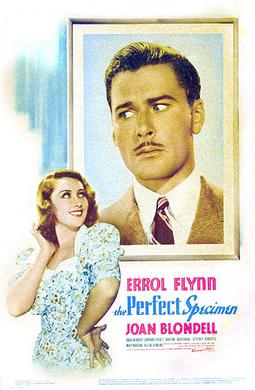
The Perfect Specimen is a 1937 American romantic comedy film directed by Michael Curtiz and starring Errol Flynn and Joan Blondell. The picture is based on a novel by Samuel Hopkins Adams.
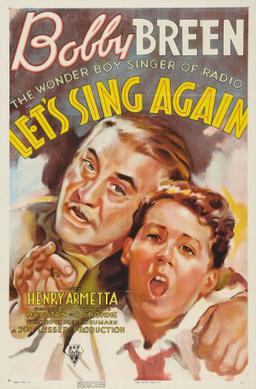
Let's Sing Again is a 1936 American musical drama film directed by Kurt Neumann and starring Bobby Breen, Henry Armetta and Vivienne Osborne. It was produced and distributed by RKO Pictures.
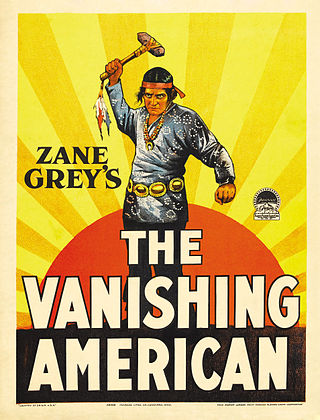
The Vanishing American is a 1925 American silent Western film produced by Famous Players–Lasky and distributed through Paramount Pictures. The film was directed by George B. Seitz and starred Richard Dix and Lois Wilson, recently paired in several screen dramas by Paramount. The film is based on the 1925 novel The Vanishing American by Zane Grey. It was remade as a 1955 film starring Scott Brady and Audrey Totter.
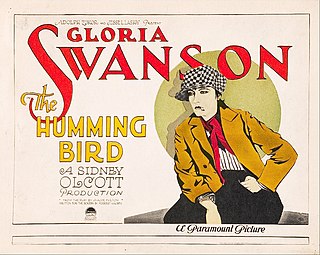
The Humming Bird is a 1924 American silent crime drama film directed by Sidney Olcott and starring Gloria Swanson. Produced by Famous Players–Lasky and distributed by Paramount Pictures, the film is based on the play of the same name by Maude Fulton, who also starred in the Broadway production.
A Harp in Hock, also known as The Samaritan, is a lost 1927 American silent melodrama film directed by Renaud Hoffman, produced by DeMille Pictures, and distributed by Pathé Exchange. The film starred Rudolph Schildkraut, Junior Coghlan, May Robson, and Bessie Love, and was based on the short story by Evelyn Campbell.
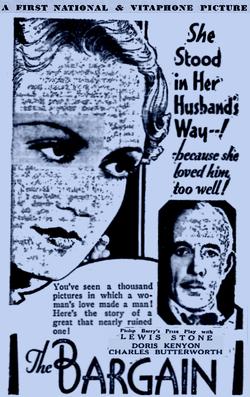
The Bargain is a 1931 American pre-Code comedy drama film produced and released by First National Pictures, a subsidiary of Warner Bros., and directed by Robert Milton. The movie stars Lewis Stone, Evalyn Knapp, Charles Butterworth and Doris Kenyon. It was based on the 1923 play, You and I, by Philip Barry.

Marilyn Knowlden is an American former child actress. She started appearing in Hollywood films in 1931 when she was four years old. She established herself as a freelancer who worked frequently at different major film studios throughout the decade, being cast in films such as Imitation of Life, Les Misérables, and Angels with Dirty Faces. She worked with film stars such as Katharine Hepburn, James Cagney, and Claudette Colbert. In total, six of the films in which she appeared were nominated for an Academy Award for Best Picture, all within the span of seven years.

Folies Bergère de Paris is a 1935 American musical comedy film produced by Darryl Zanuck for 20th Century Films, directed by Roy Del Ruth and starring Maurice Chevalier, Merle Oberon and Ann Southern. At the 8th Academy Awards, the “Straw Hat” number, choreographed by Dave Gould, won the short-lived Academy Award for Best Dance Direction, sharing the honor with “I've Got a Feelin' You're Foolin'” from Broadway Melody of 1936. The film, based on the 1934 play The Red Cat by Rudolph Lothar and Hans Adler, is a story of mistaken identity, with Maurice Chevalier playing both a music-hall star and a business tycoon who resembles him. This was Chevalier’s last film in Hollywood for twenty years, and reprised familiar themes such as the straw hat and a rendering of the French song "Valentine". This is also the last film to be distributed by Twentieth Century Pictures before it merged with Fox Film in 1935 to form 20th Century Fox.
Maury Cohen, also known as Maury M. Cohen, was an American film producer most active during the 1930s. He owned one of the Poverty Row studios, Invincible films, which specialized in making low-budget feature films. After leaving film in the early 1940s, Cohen founded and ran the historic dance club in Los Angeles, the Hollywood Palladium.

Half Angel is a 1936 American comedy film directed by Sidney Lanfield and written by Gene Fowler, Bess Meredyth and Allen Rivkin. The film stars Frances Dee, Brian Donlevy, Charles Butterworth, Helen Westley, Henry Stephenson and Sara Haden. The film was released on May 22, 1936, by 20th Century-Fox.

The Marriage Whirl is a 1925 American silent drama film directed by Alfred Santell and written by Bradley King. It is based on the 1922 play The National Anthem by J. Hartley Manners. The film stars Corinne Griffith, Kenneth Harlan, Harrison Ford, E. J. Ratcliffe, Charles Willis Lane, Edgar Norton, and Nita Naldi. The film was released on July 19, 1925, by First National Pictures.

















